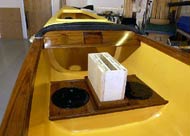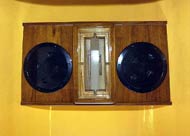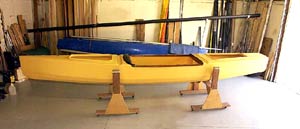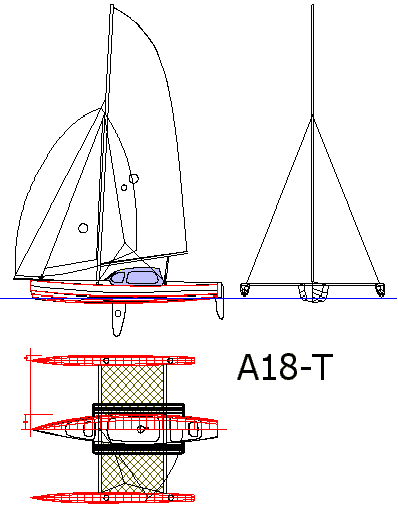The A18-T project is nearing
completion in my shop with only the simple construction of the
amas and the final painting before assembly. Testing will follow
after that. I have a plan to show her at the Vancouver Wooden
Boat Show in late August followed by the upcoming Lake Powell
Messabout in September.
The pictures show the vaka hull so you can see the shape of the
multi-chine hull with hatches fore and aft as well as the molded
grooves for mounting of the aka tubes.
(click images to enlarge) |
The main compartment is teak trimmed with an instrument dash
section to accommodate a Garmin 276C in the center and space for
a standard bulkhead mount marine compass on one side. The other
side of the dash is for a digital speed readout unit that is surface
mounted. Above the dash is a molded, spray deflection pod that
serves as a mount for a smoked Lexan visor over the instruments
as well as a mounting point for the leading edge of the dodger.
The daggerboard trunk is built to accept a Hobie Mirage drive
unit. It also takes a convertible insert that holds the high aspect
ratio foil for sailing.
 |
 |
(click images
to enlarge) |
The amas and akas will be easily demountable along with the rig
and then the vaka hull can be used as a canoe for quiet water
paddling from the traditional fore and aft seating positions.
The outer sections of aka tubes are storable in the hull.
The amas can also be connected to the shortened aka tubes closer
to the vaka hull. This allows the hull to be used as a canoe form
with a substantial set of stabilizers. I saw this application
as useful if the boat were used with a small outboard for principal
power. A small, sporty power tri for fishing, birdwatching or
jetting around the harbor.
The seats in the conventional canoe positions are fully adjustable
up, down, fore and aft as well as rake for individual comfort
and trim. They can also be quickly removed when the hatches are
installed and the boat is sailed from the tramp or central compartment.
The boat can also be sailed from these canoe seating positions.
All controls are led to the center compartment and can be accessed
from the aft position.

The boat can accept rigs up to and including those from a Hobie
16 at 218 sq. ft., complete with trap wires. The boat will also
sail well with a 146 sq. ft. Hobie 14 rig. The masts for either
of these rigs will mount to the forward aka tube. I designed the
A18 for these two rigs as they are plentiful in the used market
and are a forgiving, known rig for sail makers as well as thousands
of sailors worldwide.
The boat can also be equipped with a full dodger/bimini cover
complete with removable side curtains. Because of the control
locations and the Mirage drive potential, this means the boat
can be sailed and/or peddled comfortably in lousy conditions with
the owner staying dry and comfortable.

The A18 will make for an excellent coastal cruiser for a single
person or a really fun weekend camp cruiser for two. In setting
out the design criteria, I was looking for a boat that had a distinct
performance sailing component compared to the other sailing canoes
that I had done in the past. This is a decidedly fast sail boat
with a nod to its canoe potential.
The boat is 18 feet LOA, 15 feet BOA and draws six inches with
the board and/or Mirage up at a 750 lb. displacement. All the
hulls are built using S&G marine ply for the hull surfaces
(The vaka is 1/4" and the amas are 1/8") and strip built
decks to get the flowing contours on top. The design allows for
a centerboard setup instead of the daggerboard/Mirage trunk if
the owner prefers that arrangement. In the case of the centerboard,
human powered aux propulsion will be paddles.
Plan sets and hull kits will be available as soon as sea trials
are complete later this summer. The hull kits will be manufactured
by Waters
Dancing Kayaks out of Canada.
My experience so far is that this will be a relatively easy boat
to build for someone who has constructed a kayak or canoe already.
I would not recommend the project to a first time boat builder.
Inspiration for this boat came from a variety of sources, all
serious Watermen. Jim Brown spent a bit of time through letters
and on the phone with me a few years ago and shared his insight
freely and with enormous grace. Jim Antrim has been more than
a mentor as I have "borrowed" concepts from his phenomenal
multihulls and he has made himself available for technical and
aesthetic inspiration. John Winters has pushed the standard for
modern canoe design and gave me some powerful advice as to decision
making when outlining a design criteria. Steve Isaac of the Watertribe
clearly enunciated a concept for coastal exploring in boats that
were, at once, reachable for the common guy and could also provide
the right format for fulfilling waterborne dreams.
My website is not quite finished at this point. I'll have that
ready when I post the next report.
I'd love to hear what you guys think of the concept and potential.
Chris Ostlind
Chris@Wedgesail.com

|

